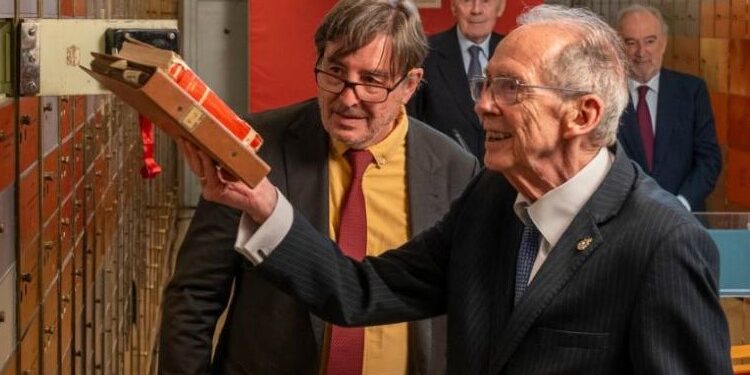The Diplomat
Yesterday, the Caja de las Letras of the I:nstituto Cervantes received the triple legacy of two generations of philologists and linguists: the in memoriam legacy of the philologist and university professor José Manuel Blecua Teijeiro (1913-2003) and his two sons, the linguist José Manuel Blecua Perdices, director of the Royal Spanish Academy from 2010 to 2015 and Academic Director of the Cervantes with the first director of the Institution, Nicolás Sánchez Albornoz, between 1995 and 1996, and the philologist and literary critic Alberto Blecua Perdices (1941-2020), this last also in memoriam.
The director of Cervantes, Luis García Montero, and as witnesses, the director of the RAE, Santiago Muñoz Machado, participated in the event; José Manuel Blecua Perdices, the former director of the Cervantes Santiago de Mora-Figueroa and Beatriz Blecua Falgueras, daughter of the honoree Alberto Blecua Perdices and professor at the University of Girona.
The legacy of Blecua Teijeiro, professor of Spanish Literature at the University of Barcelona, and Honorary Academician of the RAE, considered one of the great specialists in Spanish poetry of the Golden Age, has been kept in box number 986.
It consists of the textbook Historical Grammar for the Baccalaureate, a copy studied by the psychiatrist, essayist and also academic Carlos Castilla del Pino; a book used by Blecua Sr. in his classes at the University of Barcelona — “used and handled and that he loved very much” —, Floresta Lírica Española. Hispanic Anthology, from the Gredos publishing house; the first two volumes of the manuscript edition of Quevedo’s poetry and since he was very fond of photography, the photo of a twilight in the Pyrenees to accompany one of the owls in his collection, to which he had great appreciation.
For García Montero, thinking about José Manuel Blecua Teijeiro is “thinking about the love of knowledge, of culture, of the books that so many of us have read.” “Thinking about Spain, internal and external exile had many topics of conversation and a shared wisdom, a family truth that needed capable people to put it into motion,” said the director of Cervantes, remembering Blecua Sr.
“This is how his son José Manuel Blecua Perdices understood it and his legacy looked towards Spanish grammar, synonyms and antonyms, the broad horizon of lexicography and linguistics, always related to literature,” added García Montero, who had words of gratitude. for José Manuel Blecua Perdices and his time at the institution: “The Instituto Cervantes was fortunate to experience learning and teaching alongside his work as Academic Director.”
Blecua Perdices has great memories of his time at the Institute: “Since I worked at the Cervantes, place names are never cold again: you read that there is a drought in Egypt and you think that enrollment at the Cervantes in Cairo will drop; “You hear that something has happened in Beirut and you shudder thinking about the Cervantes of that city.”







